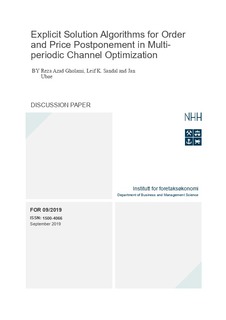Explicit Solution Algorithms for Order and Price Postponement in Multi-periodic Channel Optimization
Working paper

Åpne
Permanent lenke
http://hdl.handle.net/11250/2614276Utgivelsesdato
2019-09-09Metadata
Vis full innførselSamlinger
- Discussion papers (FOR) [566]
Sammendrag
Supply channels typically face uncertain and time-varying demand. Nonetheless, time-dependent channel optimization while addressing uncertain demand has received limited attention due to the high level of complexity of the ensuing nested equilibrium problems. The level of complexity rises when demand is dependent on current and previous prices. We consider a decentralized supply channel whose two members, a manufacturer and a retailer, must address the demand for a perishable commodity within a multi-period time horizon. Using a general (additive-multiplicative) stochastic model for the price-dependent demand, the purpose of this paper is to provide the channel members with analytic tools to devise optimal pricing and supply strategies at different times. In the first part of the paper, we propose a constructive theorem providing an explicit solution algorithm to obtain equilibrium states for bilevel optimization in decentralized supply channels. We also prove that the resulting equilibria are subgame perfect. In the second part, we allow the retailer to postpone her supply and pricing decisions until demand uncertainty is resolved at each period. Using subgame perfectness of the equilibria, we propose solution algorithms that use the extra information obtained by postponement. Finally, in a number of comparison theorems, we show that postponement strategies are always beneficial for a centralized channel (whose revenue structure is identical to that of a retailer). Whereas for a decentralized channel, due to vertical competitions, there may be scenarios wherein postponement strategies, i.e. access to extra information, turn out to be detrimental to the manufacturer and even to the whole channel.